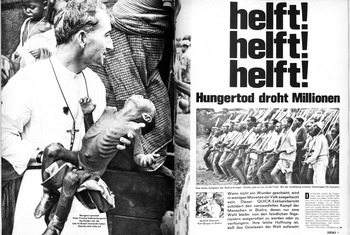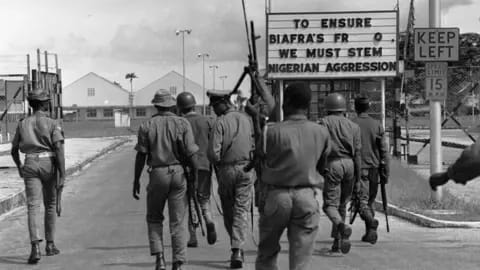Disinformation: The BBC and the UK's Role in Spinning the Biafra War
"In war, truth is the first casualty — but in Biafra, the BBC helped bury it." Col. Joe Achuzie. (Rtd).
During the Nigerian Civil War (1967–1970), also known as the Biafra War, over three million Igbo people — many of them children — died from starvation, air raids, and systemic blockades. But while the world turned a blind eye, the British Broadcasting Corporation (BBC), British Petroluem and the UK government did more than just remain silent. They actively spread misleading narratives, suppressed vital information, and manipulated global perception funded with the oil and gas in Igboland — all in service of protecting British political and economic interests in Nigeria.
The UK's Strategic Interest in Nigeria
By the 1960s, Britain had officially "decolonized" Nigeria — but unofficially, it was still pulling the strings.
Shell-BP (an Anglo-Persian Oil Company, a predecessor to BP) had millions, if not billions of pounds invested in oil fields within the Eastern Region, the heart of Biafra.
The UK government viewed a successful Biafran secession as a threat to its economic lifeline.
Therefore, it sided with the Nigerian Federal Government, led by General Yakubu Gowon, and supplied arms, military advisors, and diplomatic cover — while portraying Biafra as rebellious and illegitimate.
The BBC: Not Just a Bystander, But a Propaganda Tool
The BBC, widely seen globally as a trusted news source, functioned during the Biafra War as a mouthpiece of British foreign policy, failing in its duty to truth and objectivity.
1. Suppressing the Starvation Narrative
While independent journalists like Frederick Forsyth (then reporting for the BBC) witnessed the mass starvation and deliberate food blockades, the BBC headquarters in London either downplayed or censored these reports.
The phrase "mass starvation" was replaced with neutral or dismissive language like "food shortages" and "humanitarian concern."
"I saw children with ribs protruding like skeletons. But my reports were watered down or ignored."

German press coverage of Biafran starvation that was downplayed in BBC reporting
2. Framing the Conflict as a 'Tribal Uprising'
The BBC repeatedly portrayed the Biafra struggle as a tribal or regional rebellion, rather than a legitimate movement for self-determination and survival following genocidal pogroms against Igbos in Northern Nigeria.
This minimized the existential threat Igbos faced and painted Nigeria's military action as a restoration of order.
BBC Language Analysis
How BBC Described It:
- "Tribal conflict"
- "Regional uprising"
- "Secessionists"
- "Rebels"
The Reality:
- "Genocide"
- "Ethnic cleansing"
- "Self-determination movement"
- "Survival struggle"
3. Ignoring War Crimes and Genocide
Reports of cluster bombing, marketplace bombings, and attacks on hospitals and schools by the Nigerian military (with British-supplied weapons) were ignored or discredited.
The BBC chose not to pursue detailed investigations or air survivor testimonies.
Protecting Oil Over Lives
The British High Commission in Lagos maintained direct communication with BBC editors throughout the war. Declassified documents (FCO 65 series, UK National Archives) reveal a policy of "maintaining Nigeria's territorial integrity for long-term strategic stability" — a euphemism for protecting oil interests.
Shell-BP continued operations during the conflict, with British officials lobbying hard against sanctions.
When humanitarian groups attempted to raise alarms (e.g., Red Cross, Joint Church Aid), the BBC rarely amplified their voices.

Nigerian federal troops at a checkpoint during the Biafra War, while British media portrayed the conflict as merely a "tribal uprising"
Evidence & References
- UK National Archives – FCO 65/1187: Communications between British Foreign Office and BBC during the war.
- Frederick Forsyth – The Biafra Story (HarperCollins, 1969).
- Chima J. Korieh – The Nigeria-Biafra War: Genocide and the Politics of Memory (Cambridge Scholars Publishing, 2012).
- Moyiga Nduru – African Press and Propaganda during the Biafran War (Media History Journal, 2007).
- Chinua Achebe – There Was a Country (Penguin Books, 2012).
Why It Still Matters
The BBC has never formally apologized for its role in whitewashing the Biafra genocide. The UK government continues to withhold critical documents, and British oil companies remain silent about their wartime profits.
But today, truth-tellers across the diaspora and in Igbo land are demanding accountability, reparations, and a revision of historical narratives that continue to deny the dignity of the Biafran people.
Join the Campaign: Truth Over Empire
Sign Our Petition
Call for an official inquiry into the BBC's role in war propaganda during the Biafra War.
Support Storytelling
Support survivor storytelling projects to document what the BBC refused to broadcast.
Share This Information
Share with journalists, academics, and advocates who can amplify the call for justice.
"We may not control the airwaves, but we have the truth — and we're broadcasting it now."
